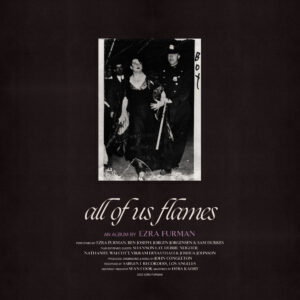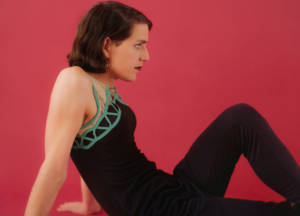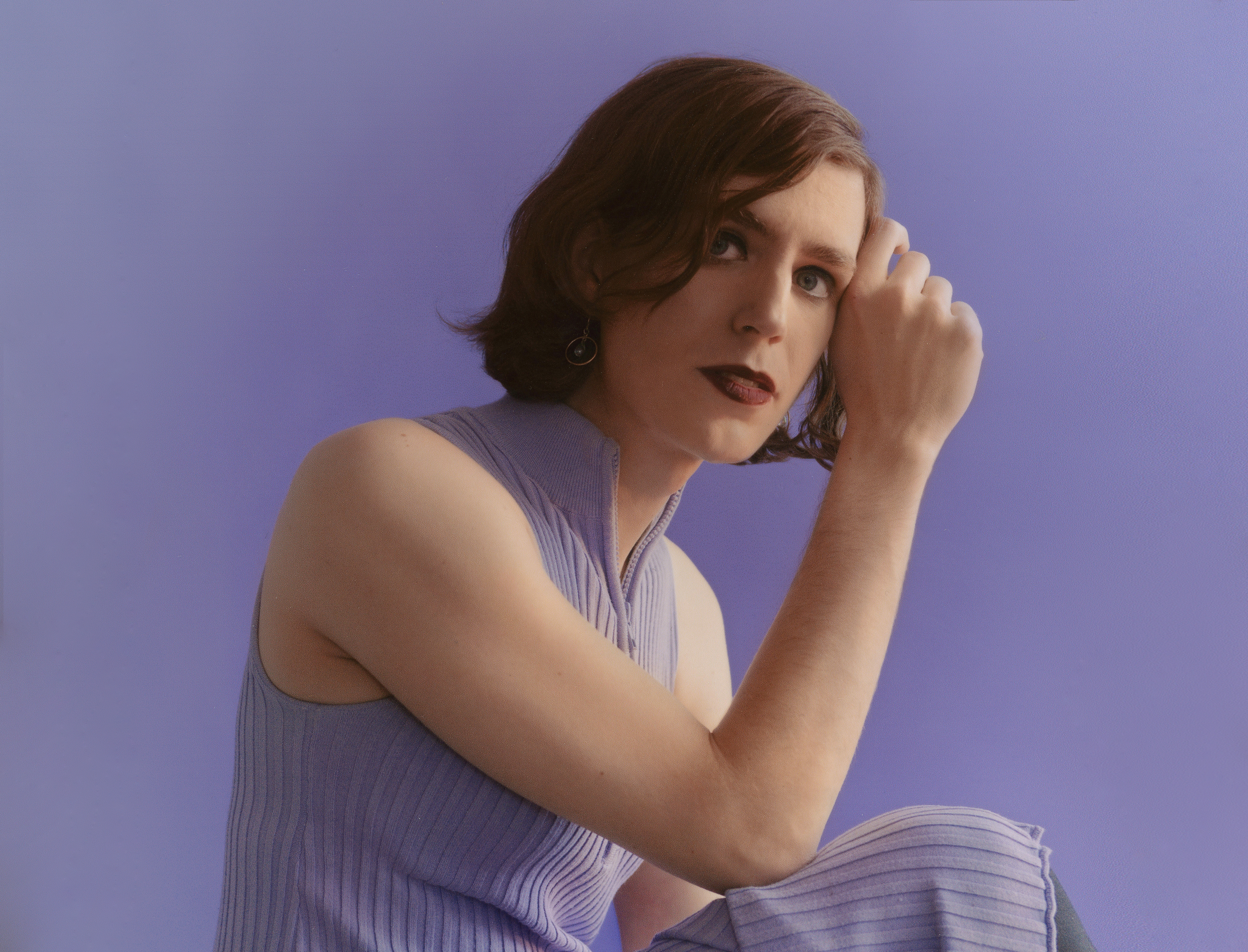Foto-© Tonje Thilesen
„I told you on the phone, I told you I was trouble, man“, singt sie in Forever In Sunset. Ezra Furman steht nach der Pandemie-Pause in den Startlöchern, ist bereiter denn je und präsentiert unterstützend ihr neues Album All Of Us In Flames. Schwierigkeiten kann man damit nur haben, wenn man etwas in der Art des Vorgängers Twelve Nudes erwartet, wenn man glaubt, sie sei eine Trans-Punkette. Besser orientiert man sich an der queeren Outlaw-Saga Transangelic Exodus aus dem Jahr 2018 als Anhaltspunkt, dem klassischen Indie- und Garagenrock von The Velvet Underground, Jonathan Richman oder frühen Violent Femmes mit Gospel, Doo-Wop, Falsett als Bonus anbei. Lilac And Black ist ein Song, der allen Trans-Frauen gewidmet ist. Ezra solidarisiert sich mit Menschen in bedrohten Gruppen in der Gesellschaft, ist ihr Sprachrohr. Aber man kann sie auch herrlich gut finden, wenn man keine Probleme hat, sich nicht diskriminiert fühlt. Ezras Musik ist wild, passioniert, melodisch und glaubwürdig. Ein Ereignis für alle. Im November kommt sie mit ihrer Band für insgesamt sieben Auftritte nach Deutschland und Österreich. Worum es dann geht, was gespielt wird und was nicht, verrät sie im folgenden Gespräch, das wir mit ihr über Zoom führen konnten.
 Apparently you went to a rabbinical school recently.
Apparently you went to a rabbinical school recently.
Just a little bit. I did enrol full time but I dropped out of all the classes except for one. The class is Talmud. It‘s about a very foundational Jewish document, it‘s as important as the Tora really. It‘s the oral tradition of ancient Judaism. Eventually it was written down but it was just orally preserved for centuries.
Why are you interested in education about that at this point in time?
I‘m obsessed with the Jewish tradition compared to many other people. Most Jewish people I know are not obsessed enough to study it. It‘s a shame. I just value ancestral traditions, I think they are beautiful and guide me in a major way. I also want to be part of the process taking that wisdom and making it better, updating it while keeping its teachings and important spirit alive. You don‘t have to hold up the parts of it that are misogynist or queerphobic. You grow it and let it evolve. I‘m trying to be a guardian of that flame.
There‘s a song called American Soil on your 2012 album The Year Of No Returning, in which you sing: „Every race has its place, every nation fights for species survival, I‘m a Jew through and through and I‘m about to write you a Bible.“ How many chapters have you written since then?
I‘m still trying to write that Bible. (laughs) You can hear in that line from ten years ago that I was just gearing up. I was trying to begin, I am about to write you a Bible and now I‘m well into that Bible. I made this body of work and I do consider it one project in a way. In terms of long-playing albums I can say that I‘ve got nine now and they form this grid of three trilogies. I‘ve got three records with my college group Ezra Furman & The Harpoons, then I had three solo albums that were a trilogy and then something happened to my writing and my concerns as an artist when Transangelic Exodus was written. It all became a little more global, less personal and more like a social check-in with civilization at large.
You have said you wanted to make songs for use by threatened communities. Why did you feel it was necessary to do that now, more than ever?
It‘s both personal and public. When I began to be a visibly gender non-conforming person, just the experience of going outside changed for me. If you get stared at or people call cruel stuff out at you, you feel less safe in the world. That was happening to me at a time as I was having a deepening social awareness just how people get screwed over in our society. It makes one want to be more in solidarity with those groups and there‘s also big urgent inspiring movements for justice going on in the USA where I see it happening. Like a lot of people in the early to mid 2010s I was having a dawning realization that in the US the cops can just kill you and pretty much get away with it, it is considered business as usual. State-sponsored murder is a real thing. It often happens to black people, but in general it happens to poor people. I start to understand how many groups and sub groups of people are threatened by that potential violence or society not properly caring for them in the US. So I started to write about what it is like to feel threatened by the EMPIRE.

You feel you‘ve got the tools to lead people into a better world?
I don‘t know about leading anyone, but we have to tend the emotional and the spiritual sides of ourselves that must be cared for in order for us to be effective workers towards justice. I guess I‘m seeing it as my role in our hopefully changing for the better world to fuel some of that human side of it. I also like to provide relief and to show solidarity in a dramatic way. It‘s not only in theory that we spend together in spiritual solidarity, but it‘s actually visible on a stage and hearable on a record. It‘s a very small part of it and doesn‘t feel enough, but I have met people who find this music that I make to be a thing that spurs them onward or gives them comfort. I know from experience that this can be essential. I use music as a survival resource, I‘m proud to make survival music for a few people. Maybe that‘s what my genre is – survival music.
Your song Dressed In Black is not a cover of the classic Shangri-Las track, it‘s about their singer Mary Weiss, how she always carried a gun on tour to protect herself. How do you defend yourself on the street?
I try to stay woke. This has become a critical buzzword for some, but it comes from black culture, it comes from black people telling each other stay woke, pay attention to what‘s going on around you. That expanded out to political and social awareness. I just keep my head on a swivel when I‘m on public transport and someone starts screaming at me…you know, next stop is my stop, I have that kind of experience. I think that‘s true for most women walking around the world. If you‘re walking alone maybe don‘t have your headphones on too loud so you can hear who‘s coming up behind you.
 Is that enough?
Is that enough?
For me it also has a lot to do with inner strength, being able to not let somebody who has hostility about my appearance screw up my day psychically. It still sometimes does but I think I‘ve developed some inner resources. This is another function of this music, I‘d like to give people, particularly trans people, some inner bolstering in times of feeling threatened. Maybe they can use my song as something reminding them of somebody who‘s on their side to tell every transphobic off. It‘s part of what the record is hoping to be, a little bit of armour or weaponry.
You are inspired by a lot by musicians past and present. One constant go-to guy for you is Bruce Springsteen, you can hear his influence on your new album again. How did he become part of your musical life and what do you find appealing about his work?
He wasn‘t one of my early favourites. But in my later teen years I discovered that…oh!… something really special is going on around here. That‘s a thing with Bruce Springsteen, you might miss that he is a great writer. From album to album it‘s the same characters sometimes with the same name seem to be going on a progression and it forms this arc over his whole body of work. That‘s such a cool thing to do! He‘s continually checking in with the same themes and the same characters, but they‘re always in a different place because he‘s in a different place as a writer. We‘re going to stay with these characters and see what happens to them as the years go on and the albums keep coming. I think I‘m doing something like that, partly consciously and partly unconsciously, but that‘s part of Springsteen‘s inheritance that he‘s left me.
Knowing all that and knowing your style can jump from one point to another, what do you like to bring to the stage during the shows that are coming up?
Oh, I don‘t know. There‘s still so much time between now and then. Maybe I‘ll cover Dark Side Of The Moon with no instruments and just voices. I could also fire the band and hire a new one, that is only going to consist of drag queens who can do a gospel performance. Expect the unexpected.
Will you include Every Feeling or Trans Mantra in the setlist?
I don‘t think we have played any songs live we do for Sex Education. So far I‘ve kept an embargo. The records I make like All Of Us Flames and the TV soundtrack stuff I do, they are separate worlds in my mind. Working for Netflix is a corporate gig for a wider audience. The music I make as an artist is for my fans and friends in the art world community. I don‘t let it bleed over.
Ezra Furman Tour:
03.11.22 Hamburg, Übel & Gefährlich
05.11.22 Köln, Kulturkirche
06.11.22 Berlin, Festsaal Kreuzberg
13.11.22 München, Freiheitshalle
14.11.22 Frankfurt, Zoom










